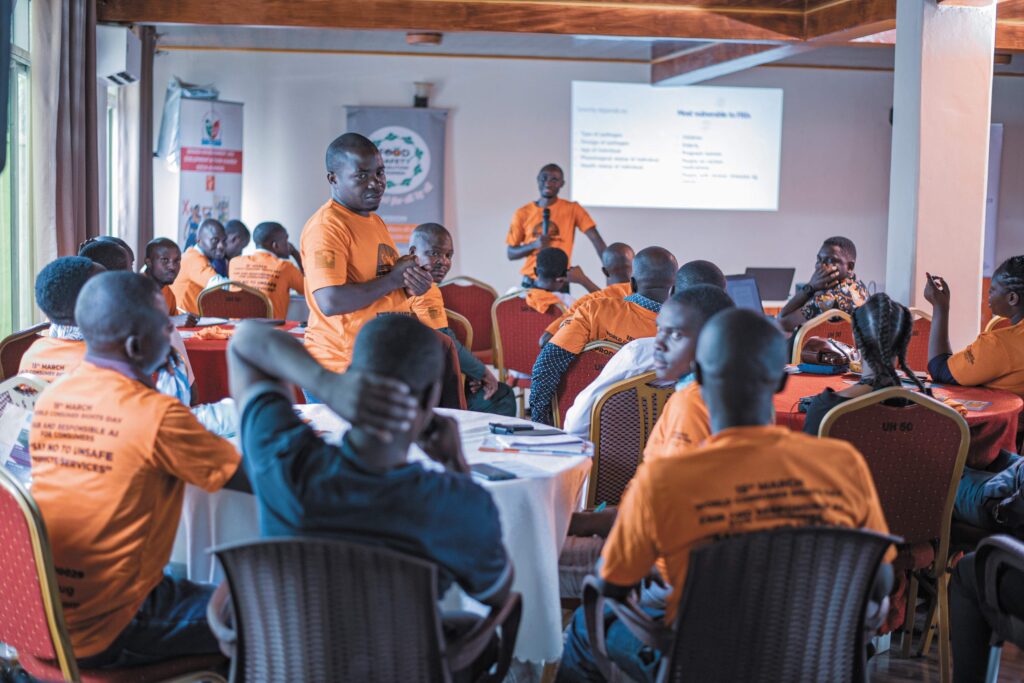In Uganda, it’s estimated that 29% of children aged 6-59 months are stunted, 4% wasted and 11% underweight with the highest burden of stunting (40.6%) among children under five years registered in the Tooro sub region(UBOS, 2016) where Kasese District is located. In addition, Kasese District is battling with a high caseload of stunting among children aged 6-59 months at 44.9% way above the Tooro sub regional and National statistics (Enos Mirembe Masereka, 2020). Stunting affects the physical and cognitive development of children affecting school performance (UNICEF, 2023). Additionally, it compromises the child’s immunity increasing their risks to infections as well as affecting the overall health and productivity of human beings (WHO, 2020)(Worldbank, 2021). Following this trend, Gender-Environment and Development Action conducted a research in Kasese District, particularly in Busongora North, one of the counties with the highest rate of teenage mothers to ascertain the stunting of Children aged 6-59 months born to teenage mothers. 337 teenage mothers from 36 villages of Maliba, Bugoye sub counties and Rugendabara and Kitswamba Sub-counties in Busongora North. The results showed that 56.4% of the children tested were stunted a very worrying number. Below is a summary of the findings; 75% of the teenage mothers had a caesarean mode of delivery - 41.2% of the children were born as preterm(before 9months) - 78% of the mothers joined primary school - 19% reached secondary school - Only 3% had started some form of a course - 91.9% were totally unemployed - Only 3.9% earned atleast a wage - 6.2% delivered from home supported by traditional birth attendants(TBA) - 69% earned/got not more than 50K Ugx in a month - 47% had very poor food consumption patterns including feeding on unsafe food. Note: 56.4% of the children born to teenage mothers were stunted with 38.6% a
 In Uganda, it’s estimated that 29% of children aged 6-59 months are stunted, 4% wasted and
In Uganda, it’s estimated that 29% of children aged 6-59 months are stunted, 4% wasted and
11% underweight with the highest burden of stunting (40.6%) among children under five years
registered in the Tooro sub region(UBOS, 2016) where Kasese District is located. In addition,
Kasese District is battling with a high caseload of stunting among children aged 6-59 months at
44.9% way above the Tooro sub regional and National statistics (Enos Mirembe Masereka,
2020).
Stunting affects the physical and cognitive development of children affecting school
performance (UNICEF, 2023). Additionally, it compromises the child’s immunity increasing
their risks to infections as well as affecting the overall health and productivity of human beings
(WHO, 2020)(Worldbank, 2021).
Following this trend, Gender-Environment and Development Action conducted a research in Kasese District, particularly in Busongora North, one of the counties with the highest rate of teenage mothers to ascertain the stunting of Children aged 6-59 months born to teenage mothers. 337 teenage mothers from 36 villages of Maliba, Bugoye sub counties and Rugendabara and Kitswamba Sub-counties in Busongora North. The results showed that 56.4% of the children tested were stunted a very worrying number. Below is a summary of the findings;
75% of the teenage mothers had a caesarean mode of delivery
– 41.2% of the children were born as preterm(before 9months)
– 78% of the mothers joined primary school
– 19% reached secondary school
– Only 3% had started some form of a course
– 91.9% were totally unemployed
– Only 3.9% earned atleast a wage
– 6.2% delivered from home supported by traditional birth attendants(TBA)
– 69% earned/got not more than 50K Ugx in a month
– 47% had very poor food consumption patterns including feeding on unsafe food.
Note: 56.4% of the children born to teenage mothers were stunted with 38.6% a
moderately and 17.8% are severely stunted.
More details can be accessed
HEREAs the world food safety day comes closer-6th June 2024, GEDA Uganda is mandated and will continue sensitizing the masses about the dangers of unsafe food, malnutrition and do what it can to change the status quo in our communities.
 In Uganda, it’s estimated that 29% of children aged 6-59 months are stunted, 4% wasted and
In Uganda, it’s estimated that 29% of children aged 6-59 months are stunted, 4% wasted and
